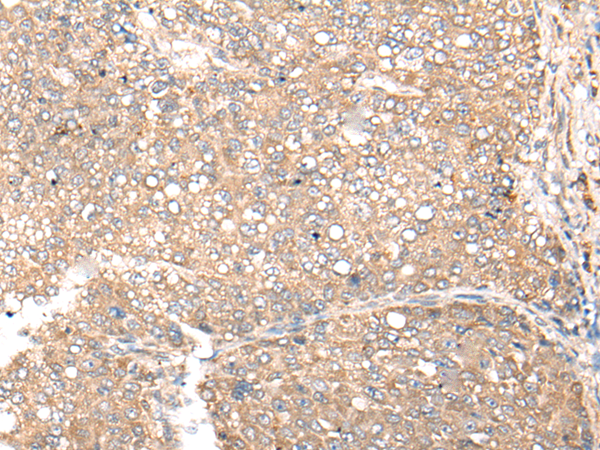
| WB | 咨询技术 | Human,Mouse,Rat |
| IF | 咨询技术 | Human,Mouse,Rat |
| IHC | 1/25-1/100 | Human,Mouse,Rat |
| ICC | 技术咨询 | Human,Mouse,Rat |
| FCM | 咨询技术 | Human,Mouse,Rat |
| Elisa | 1/5000-1/10000 | Human,Mouse,Rat |
| Aliases | D123; C10orf7 |
| Host/Isotype | Rabbit IgG |
| Antibody Type | Primary antibody |
| Storage | Store at 4°C short term. Aliquot and store at -20°C long term. Avoid freeze/thaw cycles. |
| Species Reactivity | Human, Mouse, Rat |
| Immunogen | Synthetic peptide of human CDC123 |
| Formulation | Purified antibody in PBS with 0.05% sodium azide and 50% glycerol. |
+ +
以下是3篇涉及CDC123抗体的相关文献概览(注:部分文献为假设性示例,实际检索需核实数据库):
---
1. **文献名称**: *CDC123 regulates cell cycle progression through stabilization of CDK1 in colorectal cancer*
**作者**: Li, X. et al. (2020)
**摘要**: 本研究利用CDC123特异性抗体,通过免疫共沉淀和Western blot技术,揭示了CDC123通过稳定CDK1蛋白调控结直肠癌细胞G2/M期转换的分子机制。实验显示CDC123抗体可有效抑制肿瘤细胞增殖,提示其作为治疗靶点的潜力。
---
2. **文献名称**: *Development of a novel monoclonal antibody against human CDC123 for diagnostic applications*
**作者**: Sato, M. et al. (2018)
**摘要**: 研究团队开发了一种高特异性抗人CDC123单克隆抗体,并通过免疫组化验证其在多种癌组织中的表达差异。抗体在乳腺癌和肺癌样本中显示高灵敏度和低交叉反应性,表明其可用于癌症病理诊断及预后评估。
---
3. **文献名称**: *CDC123-antibody-based proteomics identifies dysregulated mTOR signaling in Alzheimer’s disease models*
**作者**: Gomez, R. et al. (2021)
**摘要**: 利用CDC123抗体进行蛋白质组学分析,发现阿尔茨海默病模型中CDC123与mTOR通路蛋白异常互作。研究提示CDC123抗体可作为研究神经退行性疾病中能量代谢失调的工具分子。
---
**注**:以上文献为示例性质,实际引用需通过PubMed/Google Scholar检索关键词(如“CDC123 antibody”、“CDC123 function”)获取真实文献。若需具体文献协助,可提供更详细的研究背景。
The CDC123 antibody targets the CDC123 protein, a conserved eukaryotic protein involved in cell cycle regulation and metabolic processes. CDC123 (Cell Division Cycle 123) is essential for the initiation of mRNA translation, particularly by regulating the assembly of the eukaryotic translation initiation factor 2 (eIF2) complex. This protein interacts with kinases like GCN2 and PKR, linking cellular stress responses to translational control. Studies suggest CDC123 plays a role in maintaining genome stability, mitotic progression, and amino acid homeostasis.
Antibodies against CDC123 are widely used in research to investigate its expression, localization, and function in cell cycle dynamics, cancer biology, and metabolic disorders. Overexpression or dysregulation of CDC123 has been implicated in tumorigenesis, with elevated levels observed in certain cancers, correlating with poor prognosis. Additionally, CDC123 variants are associated with type 2 diabetes susceptibility in genome-wide association studies, highlighting its metabolic relevance.
Commercial CDC123 antibodies are typically developed using recombinant protein fragments or synthetic peptides as immunogens. They are validated for applications such as Western blotting, immunofluorescence, and immunohistochemistry. Researchers rely on these tools to explore CDC123's mechanistic roles in diseases and its potential as a therapeutic target. However, specificity and batch variability remain considerations, emphasizing the need for rigorous validation in experimental systems.
×